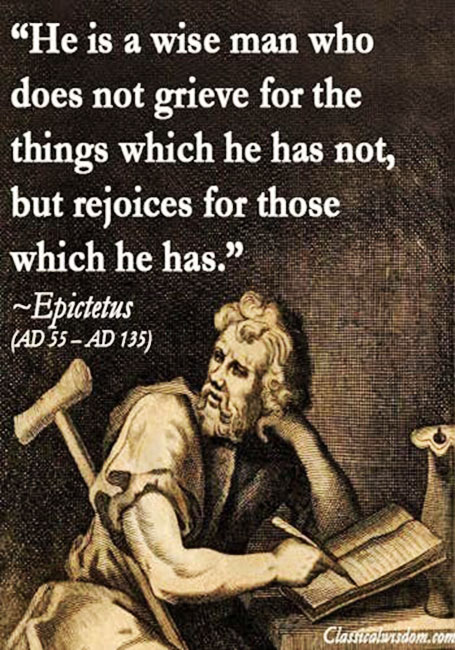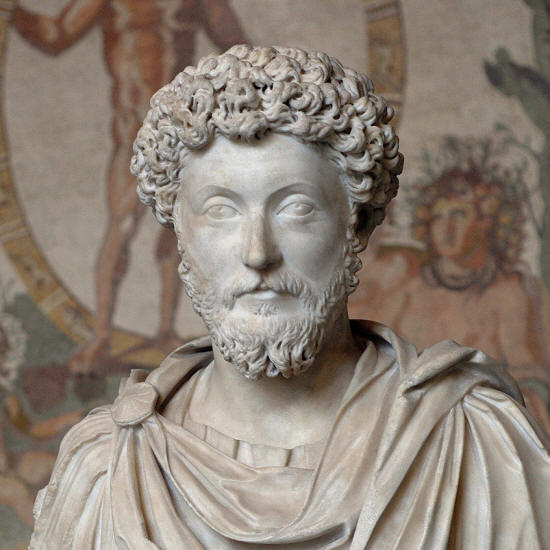|

by Van Bryan
May 03, 2024
from
ClassicalWisdom Website

What is Stoicism?
How did it come about?
What are the ins and outs of this complex
philosophy?
Where did I put my cup of coffee?
These are the types of questions that I often ask
myself whenever I sit down to write on a topic of philosophy.
And while we could spend hours and hours going over the specifics
of Stoicism, I think,
too much information at once can often lead
to an undue amount of stress...
That would, obviously, defeat the purpose of our
whole investigation.
So let's settle for an abridged definition of Stoicism and
then we will go right into a few Stoic lessons that you can apply to
your every day life to become just a little less anxious.
What is Stoicism?
Stoicism is a brand of philosophy that focuses almost exclusively on
the areas of ethics, virtues, and the very difficult task of living
a good life.
Stoicism as a way of life would
originate in Greece, as most philosophy does, in the later years of
the Hellenistic age and would gain momentum right up to the height
of the Roman Empire.
The founder was Zeno of Citium, a Greek philosopher who began
his lecturing days not long after the death of Aristotle in
322 BCE. While Zeno was the founder of the Stoicism, he is often
eclipsed by some of the more prolific Stoic authors of the Roman
empire.
Among these are,

Zeno of Citium
Stoicism taught, above all else,
that we ought to live according to nature...
They believed that there was a great design to
the universe and that nature was the highest form of perfection.
Nothing inconsequential happens within the world,
everything is, in one way or another, part of some perfectly
constructed plan. Additionally, living according to nature means
that we ought to live according to our human nature.
What is our human nature?
Well, it is our ability to think rationally
and our need to pursue wisdom and understanding...
We will be supremely happy when we are living
according to our human nature. All other things we might find,
wealth and money for instance, will never truly make us live a good
life.
Sound good so far? Of course it does...!
So if you want to live stress free and Stoically,
you might want to follow these simple rules.
Rule #1 - Recognize that which you
have control over
Do you want to know who is very good at living a Stoic life?
Recovering alcoholics have this down pat.
If you have ever spent time around recovering
alcoholics or, like me, ever worked in a facility for addiction
treatment, then you have probably heard the Serenity Prayer...:
God grand me the serenity to accept the
things I cannot change, the courage to change the things I can,
and the wisdom to know the difference.
What is interesting about that expression, is
that it almost perfectly summarizes our first rule of living a
stress free, Stoic life.
The first thing we have to do is
recognize what we have control over and what we do not.
Let's say you are stuck in traffic, the cars are
stacked one on top of the other for miles.
Now, you could very easily become disheartened by
such a situation. Perhaps the stress could get to you and you could
start tearing out your hair.
But now let's ask another question.
Do you really have any control over the
traffic?
Of course you do not.
There is nothing in your power that you can do.
You cannot split the traffic as if you were Moses splitting the Red
Sea. You cannot fly out your window and escape I 95.
We must recognize that the situation is out of
our hands, there is nothing to be done.
We can apply this principle to all sorts of things.
Whenever you are in a stressful situation, we
must ask if we have any meaningful control.
The answer, very often, is no...
We, as individuals, can no more meaningfully effect the economy or
world affairs any more than we can effect the rotation of the earth.
Believe me, I have friends who are brokers in New York City. They
tell me the same thing...

The Stoic philosopher, Epictetus said as much as this within
his Discourses.
The philosopher suggests that much of our anxiety
stems from our desire to have things that are not within our power
to give.
"A lute player when he is singing by himself
has no anxiety, but when he enters the theatre, he is anxious
even if he has a good voice and plays well on the lute; for he
not only wishes to sing well, but also to obtain applause: but
this is not in his power."
Epictetus
(Discourses)
So we are often wracked by anxiety when
encountering situations whose outcome we cannot control.
Will we ever escape the gridlock heading
north out of Miami?
Will the lute player receive an applause
after playing the lute?
We don't know...
More importantly, we can't know. All we can do is
manage our reactions and maintain our Stoic demeanor. Oh, and we
could just try to play the lute as best we can.
Whatever is meant to happen, will happen.
Rule #2 - Recognize real problems
from imaginary problems.
Taking another tip from Epictetus, we know that...
"Man is not worried by real problems so much
as by his imagined anxieties about real problems"
Epictetus
"But what if... " is a rather popular statement
for the more anxious among us. "But what if... " give us an excuse
to worry over problems that have not arisen yet.
It gives us an excuse to stress.

Epictetus
When we consider problems that are very real, that are happening
here and now, what do we really have?
Perhaps there are actual concerns, but more often
than not they are simply concerns of what MIGHT happen rather than
what IS happening.
So if you want to live like a Stoic, and apparently you do, then you
really ought to consider which of your problems are real and which
are inventions of an overly anxious mind.
Rule #3 - Learn what you can live
without
What do you really need?
Have you ever thought about that?
Insofar as you are a human being, what do you
need?
Are you more successful as a rational
individual if you have a flat screen television?
Are you more noble or glorious as a person if
there is a Mercedes Benz in your drive way?
In the course of Discourses, Epictetus
comments on how he finds it strange that we continue to attach
ourselves to more and more things, even when these things very often
bring us misery.
"But now when it is in our power to look
after one thing [our minds/ rational soul], and to attach
ourselves to it, we prefer to look after many things, and to be
bound to many things, to the body and to property, and to
brother and to friend, and to child and to slave.
Since, then, we are bound to many things, we
are depressed by them and dragged down."
Epictetus
Living Stoically is not easy.
It asks us to surrender many of our desires;
chief among these are our desires for luxury and wealth.
While we may want these things, our desire for
them very often lead to disappointment and sadness.
We continuously look toward what we want and
refuse to recognize that which we already have.
Yet the important thing is to recognize the
good things you already have and set some reasonable goals for
yourself.
Put more succinctly by
Marcus Aurelius...
"When you arise in the morning think of what
a privilege it is to be alive, to think, to enjoy, to love ... "
Marcus Aurelius
(Meditations)
Rule #4 - Cultivate your inner
self
Okay, so this has been a rather difficult process for some of us.
All we have done so far is talk about things that
we should stop doing.
Stop worrying about things that are beyond
our control.
Stop creating problems that may happen in the
future.
Stop creating unnecessary desires that you
think will make you happy.

Marcus Aurelius
So what can we actually do...?
Well, the Stoics would tell you that you ought to cultivate the one
thing that you actually do have control over, your inner self. When
it comes right down to it you are not in control over the economy,
the world, or even your body.
You are, however,
in control of the state of your mind and your
soul...
If we are most human when we are actively
pursuing knowledge or understanding, then we will also be happiest
while performing these tasks.
Who you are, the only part of you that is of
any real consequence, is your inner self.
It is the part of you that comes to understand
virtue through doing virtuous acts, wisdom through pursing true
understanding.
The Stoics believed that a peasant could be happy so long as he was
a sage, but a king would be miserable unless he was also a sage.
And while the king might have more markers in the
game of life, more cards up his sleeve, what is of real importance
is how you play, not if you win or not.
And I know that some of these rules are rather difficult for us.
It is not an easy thing to let go all of our
desires, our woes, our fears just because some philosophers
thousands of years ago said that the universe had a plan for us.
Believe me, I know...
Still, if you could follow even one of these rules within your daily
life, I think you might find that you become just a little less
anxious.
And you might soon be on your way to living a
stress-free, Stoic existence...
|






